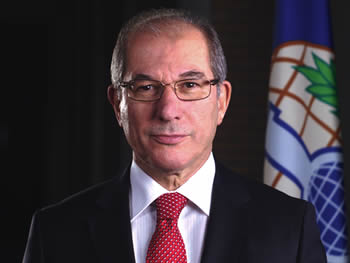OPCW Marks Completion of Destruction of Russian Chemical Weapons Stockpile

Featured image: OPCW Director-General Ahmet Üzümcü (Source: OPCW)
In the margins of the 86th Session of the Executive Council of the Organisation for the Prohibition of Chemical Weapons (OPCW), a ceremony to mark the completion of the destruction of the Russian Federation’s chemical weapons took place today at the residence of Ambassador Alexander Shulgin, the Permanent Representative of the Russian Federation to the OPCW. The Permanent Representatives and delegates from States Parties to the Chemical Weapons Convention (CWC) and OPCW Technical Secretariat staff attended the ceremony.
The Head of the Russian National Authority, Deputy Minister of Industry and Trade, Mr Georgy Kalamanov, delivered a statement expressing his thanks to the OPCW and States Parties for supporting the destruction programme.
OPCW Director-General, Ambassador Ahmet Üzümcü, acknowledged the remarkable achievement by the Russian Federation and presented a memorable certificate to Deputy Minister Kalamanov marking the full destruction of the 39,967 metric tons of Russian chemical weapons. He also gave a commemorative plate to General Viktor Kholstov to recognise his personal commitment to and efforts in achieving this milestone.
The OPCW’s inspection teams have verified the destruction at seven chemical weapons destruction facilities in the Russian Federation. On 27 September 2017, the last of these facilities, located in Kizner, officially concluded its operations.
With the total elimination of Russia’s declared chemical weapons programme, 96.3 per cent of all chemical weapon stockpiles declared by possessor States have been destroyed under OPCW verification.
Background
As the implementing body for the Chemical Weapons Convention, the OPCW oversees the global endeavour to permanently eliminate chemical weapons. Since the Convention’s entry into force in 1997 – with its 192 States Parties – it is the most successful disarmament treaty eliminating an entire class of weapons of mass destruction.
For its extensive efforts in eliminating chemical weapons, the OPCW received the 2013 Nobel Prize for Peace.

